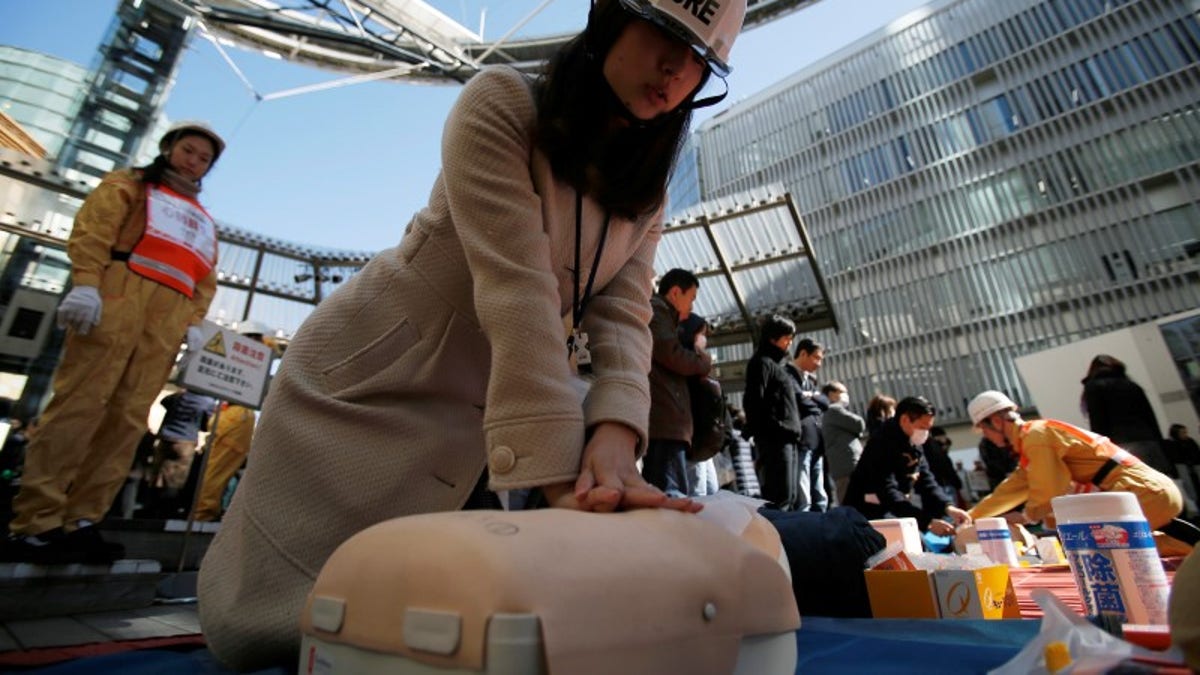
Participants practice cardiopulmonary resuscitation (CPR) during a disaster drill at the Roppongi Hills complex in Tokyo (Copyright Reuters 2016)
The odds of surviving a cardiac arrest are higher if the rescuer performing CPR is heavier in weight and has upper body strength, researchers say.
"Our results confirm that the heaviest people perform CPR better than those who are underweight," they report in the American Journal of Emergency Medicine.
Upper body strength can offset the disadvantages of low weight, however, according to Angel Lopez Gonzalez of the School of Nursing at University of Castilla-La Mancha in Albacete, Spain and colleagues.
First responders should be advised to exercise arm strength to improve the quality of CPR, they write in their report.
The findings shouldn't stop average people from getting CPR training, said Dr. Robert Shesser, chair of the Department of Emergency Medicine at the George Washington University School of Medicine and Health Sciences in the District of Columbia, who was not involved with the study.
"The more people who know CPR, the higher the chance of saving someone's life," Shesser told Reuters Health.
Each year in the U.S., more than 350,000 cardiac arrests occur outside of hospitals, according to the American Heart Association. CPR can double or triple a person's chance of survival.
Chest compressions - pushing down hard and fast at the center of the chest - help deliver blood to the heart and brain while the heart is stopped.
The new study included 63 college students. About 44 percent were underweight, about 52 percent were normal weight for their height and about 5 percent were overweight or obese.
Upper body strength was evaluated using a handgrip to measure the force of grip strength in each hand.
Participants received a 30-minute session of training in basic CPR 48 hours before the CPR test.
For the test, they had to perform CPR on a mannequin for 20 minutes or until exhaustion. Chest compression parameters included how fast they performed compression, the correct location, the compression depth and the relation between compression and rest phases.
Participants who were underweight achieved lower scores in compression parameters than those who were normal weight or overweight.
But the effect of the volunteers' size on their performance of CPR was partly mediated by muscle strength, the authors found.
Volunteers with medium or high muscle strength achieved higher scores in compression depth and adequate compression than participants with low upper body strength.
The study was done in "a very controlled environment," Shesser said. "This is just a laboratory type of study. Subjects of the test had their strength measured, but it wasn't done in a real life cardiac arrest situation."
What's most important is that people get CPR training, regardless of their size, noted Shesser.
"There's no doubt that CPR training is going to improve outcomes of cardiac arrest," he said. "A little bit of training goes a long way."
Formal training is best, but the American Heart Association also offers instructions for CPR on its website, here: http://bit.ly/1OZ8SAY.








































